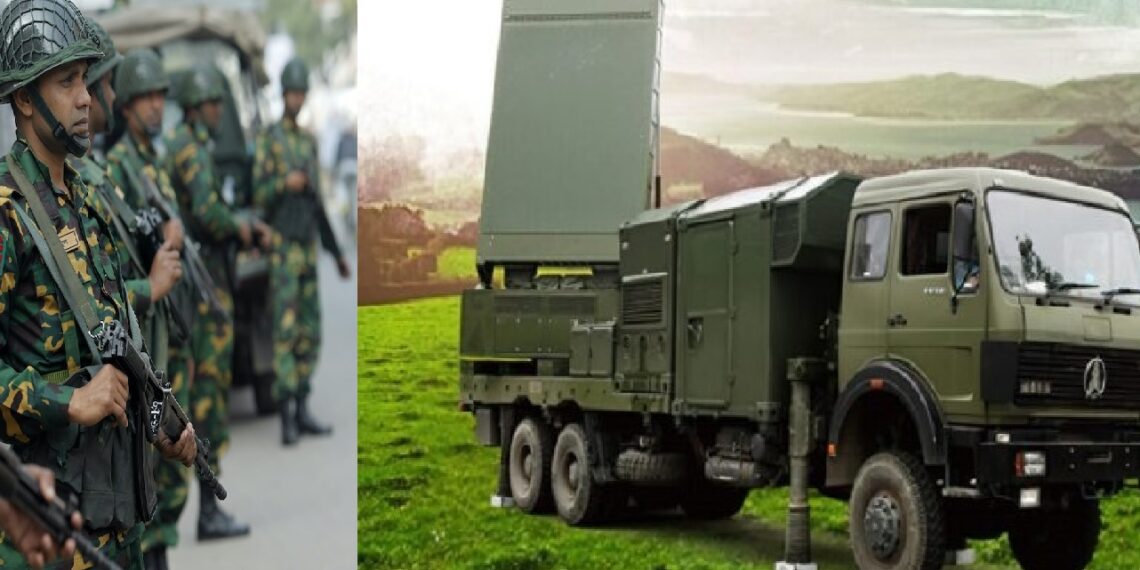Five days before Bangladesh interim authority Chief Advisor Mohammad Yunus left for China on March 26, the Directorate General of Forces Intelligence (DGFI) ‘accorded security clearance’ to four Chinese nationals, enabling them to hold a meeting with Bangladesh Army officers on their plans to procure weapons locating radars.
Documents in possession of Northeast News show that the four Chinese nationals were identified as Fan Chong (Passport No. PE2132130), Xiao Qiao (Passport No. PE2189093), Liu Zhiwei (Passport No. PE2227224) and Long Yun (Passport No. 2311603).
The meeting between the Chinese nationals, whose professional background remains unclear, though it is suspected that they represented the state-owned China North Industries Group Corporation Limited, or Norinco, was held at the Bangladesh Army’s Multipurpose Complex on Shahid Sarani, within Dhaka cantonment.
The meeting was held on March 24, two days before Yunus reached China.
The Chief Advisor’s Office and the Intelligence Directorate under the Armed Forces Division was kept abreast of the DGFI’s permission given to the Chinese nationals whose passports and valid immigration documents were duly verified before entry into the Army complex.
The purpose of the meeting was to “discuss about weapon locating radar system (Model: SLC-2),” the documents reveal. Senior officers from the Army’s Directorate of Artillery were also under instructions to “remain present during the discussion session”.
Now, less than a month before this meeting, on February 25, Bangladesh’s Army headquarters sent out an office order related to an official tour to Pakistan’s Taxila of seven Bangladesh Army officers in respect of the “upgradation” of 98 battle tanks at the Margalla Heavy Industries Ltd.
The office order originated from the office of the Principal Staff Officer, Armed Forces Division, under the Chief Advisor’s Office.
The ‘special team’ of officers were to Margalla Heavy Industries Ltd between March 2 and 7 to oversee the up-gradation of 40 T59-KMK and 58 T-69G. The visit was given a wide window – the Bangladesh Army could visit the Taxila-based company anytime till April 30.
The Bangladesh Army, documents in the possession of Northeast News show, was invited by the Dhaka-based Pakistan High Commission’s defence wing (through a February 13 letter) to undertake the visit to Taxila.
The seven-member Bangladesh Army team, led by Brigadier General Khairul Islam, did indeed visit the Taxila complex of Margalla Heavy Industries Ltd.
A Departure Card, filled in by Brig Gen Khairul Islam during immigration procedure, show that he boarded a Thai Airways flight (TG-322) on March 3.
The rest of the team, comprising a colonel, two lieutenant colonels, two majors and a captain, accompanied Brig Gen Khairul Islam.
They took a roundabout route to Bangkok before landing in Islamabad the same day.
The Bangladesh Army’s February 25 office order reveals that the visiting officers were to be guests of Heavy Industries Taxila who would bear all their local expenses.
The up-gradation of the tanks was necessitated by the fact that their 100 mm guns and ammunition were “on the point of becoming obsolete”. Besides, Bangladesh Army documents reasoned, that essential components of the two series of tanks were also “not readily available in the international market”.
More importantly, the Bangladesh Army’s justification for the up-gradation was based on the realisation that the “fire control systems” of the two tanks’ series were “completely manually operated” which was “antagonistic” in today’s militarily competitive world.
Bangladesh’s Armoured Corps Division commands 174 59-G Durjoy, 58 69-IIG, 44 MBT-2000 and five VT-5 types of tanks.
While the document did not rule out the procurement of new tanks, it argued that upgradation of the two tank types would vastly enable their “modernisation and therefore battle-readiness”.
The Bangladesh Army’s decision to upgrade the armoured assets followed a five-day official visit to Rawalpindi of Principal Staff Officer, AFD, LieutenantGeneral Kamrul Hassan in January this year.
This was followed by the visit to Bangladesh of a three-member ISI team led by a major general, the same month.















